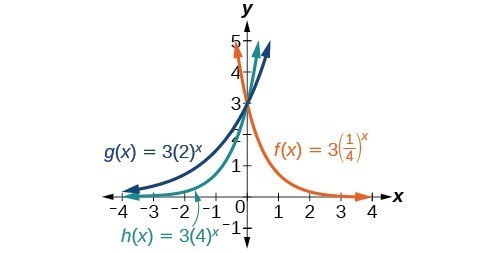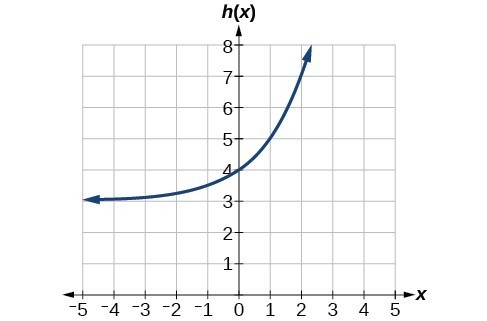Solutions to Odd-Numbered Exercises
1. Linear functions have a constant rate of change. Exponential functions increase based on a percent of the original.
3. exponential; the population decreases by a proportional rate.
5. not exponential; the charge decreases by a constant amount each visit, so the statement represents a linear function.
7. The forest represented by the function [latex]B\left(t\right)=82{\left(1.029\right)}^{t}[/latex].
9. After t = 20 years, forest A will have 43 more trees than forest B.
11. Answers will vary. Sample response: For a number of years, the population of forest A will increasingly exceed forest B, but because forest B actually grows at a faster rate, the population will eventually become larger than forest A and will remain that way as long as the population growth models hold. Some factors that might influence the long-term validity of the exponential growth model are drought, an epidemic that culls the population, and other environmental and biological factors.
13. exponential growth; The growth factor, 1.06, is greater than 1.
15. exponential decay; The decay factor, 0.97, is between 0 and 1.
17. [latex]f\left(x\right)=2000{\left(0.1\right)}^{x}[/latex]
19. continuous growth; the growth rate is greater than 0.
21. continuous decay; the growth rate is less than 0.
23. [latex]f\left(-1\right)=-4[/latex]
25. [latex]f\left(-1\right)\approx -0.2707[/latex]
27. [latex]f\left(3\right)\approx 483.8146[/latex]
29. 47,622 fox
31. 1.39%; $155,368.09
33.

35. B
37. A
39. E
41. D
43. C
45. Horizontal asymptote: [latex]h\left(x\right)=3[/latex]; Domain: all real numbers; Range: all real numbers strictly greater than 3.

47. [latex]g\left(6\right)=800+\frac{1}{3}\approx 800.3333[/latex]
49. [latex]h\left(-7\right)=-58[/latex]
Candela Citations
- Precalculus. Authored by: Jay Abramson, et al.. Provided by: OpenStax. Located at: http://cnx.org/contents/fd53eae1-fa23-47c7-bb1b-972349835c3c@5.175. License: CC BY: Attribution. License Terms: Download For Free at : http://cnx.org/contents/fd53eae1-fa23-47c7-bb1b-972349835c3c@5.175.